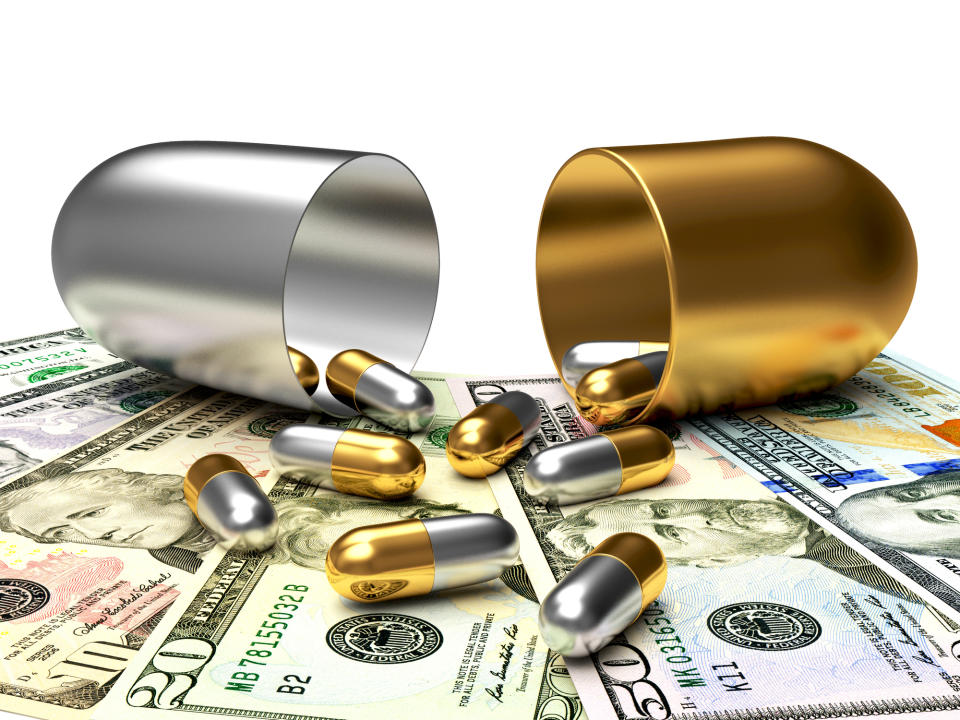3 Top Dividend Stocks to Buy in June
LVMH Moet Hennessy-Louis Vuitton SA (NASDAQOTH: LVMUY), Verizon (NYSE: VZ), and Gilead Sciences (NASDAQ: GILD) are very different companies, but each has one thing in common: a dividend yield that could head higher because of improving financials. Here's why three Motley Fool contributors believe buying these top dividend stocks in income portfolios makes sense.
The 800-pound gorilla of the high-end luxury market
Leo Sun (LVMH): LVMH, the largest luxury company in the world, is an ideal trade-war stock for three reasons:
It's based in Europe, which isn't engaged in a trade war with China.
High-end luxury products are generally considered recession-proof.
It's well diversified across five markets: fashion and leather goods, selective retailing, perfumes and cosmetics, wines and spirits, and watches and jewelry.

IMAGE SOURCE: GETTY IMAGES.
LVMH's portfolio of 70 brands includes Louis Vuitton, Fendi, Christian Dior, Loewe, and Marc Jacobs; jewelry and watch brands like Bvlgari and Tag Heuer; retailers like Sephora and Le Bon Marche; and wine and spirit brands like Hennessy, Dom Perignon, and Moet & Chandon.
LVMH's organic sales rose 11% last year, as all five of its business segments posted positive sales growth and expanded their operating margins. Its profit from recurring operations rose 21% as its net profit grew 20%. That robust growth boosted its free cash flow 16% to 5.5 billion euros ($6.1 billion) for the full year -- and it spent 3 billion euros on dividends and another 800 million euros on buybacks.
LVMH has raised its dividend annually at an average rate of 14% over the past five years. It currently pays a forward dividend yield of 2.3%. The stock isn't cheap at 27 times earnings, but I'm personally willing to pay that premium for its insulation from the trade war, recession-proof business model, and dependable dividend.
A top wireless dividend
Travis Hoium (Verizon Communications): The telecommunications business hasn't gotten a lot of love from investors recently, but that doesn't mean there aren't values to be found in the industry. I think wireless behemoth Verizon Communications is well positioned for long-term growth and has a solid dividend of 4.3% for investors to generate cash from.
Verizon's core business of selling wireless service in the U.S. is a cash machine and makes the entire business run. The downside is that it requires billions in capital expenditures to build wireless networks -- but that required scale is a deterrent to competitors who may want to enter the market.
VZ Cash from Operations (TTM) data by YCharts.
Verizon has faced pricing pressure from companies like T-Mobile and Sprint, but they're attempting to merge in a deal that would leave an oligopoly atop wireless. The dynamic could lead to higher prices if the two small competitors aren't using price to attract customers, allowing Verizon to increase its own margins.
But the biggest reason to own Verizon long term is 5G. The company is a leader in building out 5G technology in the U.S., and that could open up an incredible number of new markets. 5G hubs are first being launched in the home, a place Verizon rarely reaches customers. From there, we will see everything from cars to VR headsets to city infrastructure working on the technology. With a leading 5G network, Verizon should be able to grow revenue and earnings long term.
Not only is Verizon's core business enough to justify buying its 4.3% dividend yield, its growth opportunity in 5G is reason to be very bullish on the company's future.

IMAGE SOURCE: GETTY IMAGES.
The worst might be behind this big biopharma
Todd Campbell (Gilead Sciences): This biotech behemoth may be at a turning point. After enduring years of slowing revenue because of a shrinking addressable market and falling hepatitis C treatment prices, sales could be about to turn higher as fast-growing HIV drugs offset future HCV weakness and new products make it to market.
In the first quarter, HIV product sales improved to $3.6 billion from $3.2 billion last year, offsetting a decline in HCV sales to $790 million from $1 billion one year ago.
Importantly, the company is on the cusp of filing for European approval of its most significant medicine in years, the rheumatoid arthritis drug filgotinib. In trials, adding filgotinib to methotrexate, a common first-line RA therapy, improved clinical remission rates versus methotrexate alone. Trials also showed filgotinib can match Humira's performance in methotrexate nonresponders, with an arguably better safety profile.
Initially, Gilead Sciences is targeting a European filing for approval this year. It also plans to sit down with the Food and Drug Administration to figure out a timeline for a U.S. filing soon.
Additionally, Gilead Sciences' push into cancer treatment is taking root. Sales of the company's first cancer gene therapy, Yescarta, a chimeric antigen receptor T-cell (CAR-T) for non-Hodgkin's lymphoma, more than doubled year over year to $96 million last quarter. Data from a trial of a tweaked version of Yescarta, KTE-X19, for mantle cell lymphoma is expected this year, and if it's good, a filing for FDA approval is anticipated thereafter. There's no guarantee the trial will succeed, but impressive data showing a 68% complete response rate in relapsed or refractory acute lymphoblastic leukemia was presented earlier this month.
Granted, Gilead Sciences still has work to do. Sales only inched up year over year to $5.3 billion from $5.1 billion in Q1, and full-year sales guidance still calls for revenue to dip this year to $21.3 billion from $22.1 billion in 2018.
Nevertheless, I'm encouraged by the progress. And with shares yielding a healthy 3.9% and $30 billion in cash backing that yield, I think it could be a smart time to buy Gilead Sciences for income portfolios.
More From The Motley Fool
Leo Sun owns shares of LVMH Moet Hennessy L.V. (ADR). Todd Campbell owns shares of Gilead Sciences. His clients may have positions in the companies mentioned. Travis Hoium owns shares of Verizon Communications. The Motley Fool owns shares of and recommends Gilead Sciences. The Motley Fool recommends Verizon Communications. The Motley Fool has a disclosure policy.

